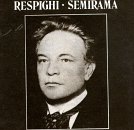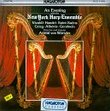| All Artists: Ottorino Respighi, Lamberto Gardelli, Hungarian State Orchestra, Lajos Miller, Laszlo Polgar, Tamas Clementis, Eva Marton, Veronika Kincses, Lando Bartolini Title: Respighi: Semirama Members Wishing: 0 Total Copies: 0 Label: Hungaroton Release Date: 5/17/1993 Album Type: Import Genre: Classical Style: Opera & Classical Vocal Number of Discs: 2 SwapaCD Credits: 2 UPCs: 750582178924, 5991813119728 |
Search - Ottorino Respighi, Lamberto Gardelli, Hungarian State Orchestra :: Respighi: Semirama
 | Ottorino Respighi, Lamberto Gardelli, Hungarian State Orchestra Respighi: Semirama Genre: Classical
|
Larger Image |
CD DetailsSimilar CDs |
CD ReviewsSalome among the Pines of Rome 04/28/2000 (4 out of 5 stars) "Yes, Marton comes across splendidly in this recording. More invloved and animated with singing sweeter than you've heard before (reading the review below- I wasn't aware that Marton recorded Korngold's Das Wunder der Heliane; she did record Korngold's Violanta and did a beautiful job). A couple of spoken lines are HIGHLY dramatic: growled out with delicous menace. The smaller soprano Kincses sounds remarkably like Lucia Popp (which of course is a compliment) and while she is strained at times, it is still a fine performance. Unfortunately (MOST unfortunately) the tenor is Bartolini who is just plain awful. His tone is coarse at all times, and he sings out of tune. And dynamic shading or sensitive phrasing? Forget it. What a shame that such ugly singing mars the luxurious duet. Still- in spite of that, Resphigi's opulent music (and Marton's performance) win the day, and because of them, you may find that you can mentally cut Bartolini out and fantasize that Bjoerling or Domingo is singing." Marton at her strongest in a delightful rarity 01/06/2000 (4 out of 5 stars) "Respighi seems destined to be known from his overplayed Roman trilogy only; his career was more interesting than even that lush triptych. His early opera Semirama (same story as Rossini's Semiramide, more or less) is a luxuriant flowering of early 20th-century Italian opera, like Montemezzi's L'Amore dei Tre Re or Leoni's L'Oracolo; all have disappeared in Puccini's enormous shadow. (There has been speculation that Puccini "borrowed" the riddle scene -- and maybe much else -- for Turandot, unfinished at his death in the mid-1920s, from this opera, written in the first decade of the 20th century.) But Semirama makes for grand listening, and it provides Marton a role she glories in: just listen to her peal forth endlessly burnished tones with a score that does justice to her opulent instrument, often misused in too-big, and perhaps too incisive, roles like Brunnhilde and Elektra. This recording is not only a rarity but a delight."
|

 Track Listings (13) - Disc #1
Track Listings (13) - Disc #1